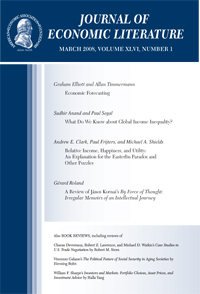精英管理和代表制
IF 11.5
1区 经济学
Q1 ECONOMICS
引用次数: 0
摘要
在各州的全民公决和许多反对大学招生政策的法律文件中,反映出精英管理的一个标准概念是,选拔规则应该无视群体身份,对过去的成就进行单调的衡量。我们提出了挑战这一观点的理论论证和调查实证证据。过去的成就往往是多种特征的混杂信号,其中一些特征对未来的表现影响更大。在这种情况下,群体认同可以作为成功的预测因素提供信息,资源劣势群体的代表性增加可以提高组织绩效。这一观点有助于解释最近一些关于群体偶然性选择的效率效应的实证发现,并将我们推向一个与组织使命更紧密联系在一起的精英管理概念。(j23, i26, i28, j15)本文章由计算机程序翻译,如有差异,请以英文原文为准。
Meritocracy and Representation
A standard conception of meritocracy, reflected in state referenda and the many legal filings against university admissions policies, is that selection rules should be blind to group identity and monotonic in measures of past accomplishment. We present theoretical arguments and survey empirical evidence challenging this view. Past accomplishment is often a garbled signal of multiple traits, some of which matter more for future performance than others. In such cases, group identity can be informative as a predictor of success and the increased representation of resource-disadvantaged groups could improve organizational performance. This perspective helps explain some recent empirical findings regarding the efficiency effects of group-contingent selection and moves us toward a conception of meritocracy more closely tied to organizational mission. (JEL I23, I26, I28, J15)
求助全文
通过发布文献求助,成功后即可免费获取论文全文。
去求助
来源期刊

Journal of Economic Literature
ECONOMICS-
CiteScore
17.80
自引率
0.80%
发文量
49
期刊介绍:
Commencing in 1969, the Journal of Economic Literature (JEL) serves as a vital resource for economists, offering a means to stay informed about the extensive literature in the field. Each JEL issue features commissioned, peer-reviewed survey and review articles, book reviews, an annotated bibliography categorizing new books by subject, and an annual index of dissertations from North American universities.
 求助内容:
求助内容: 应助结果提醒方式:
应助结果提醒方式:


